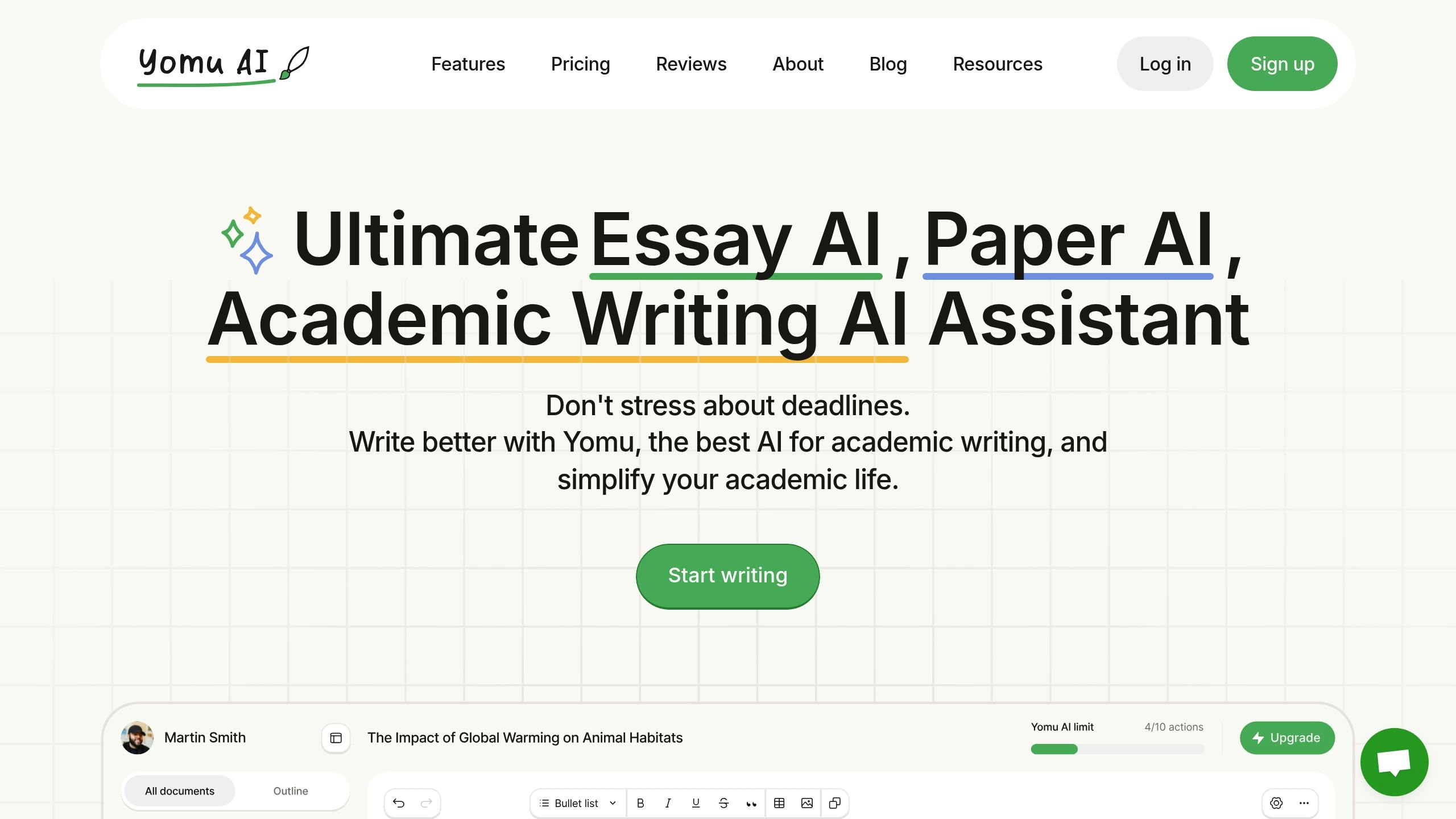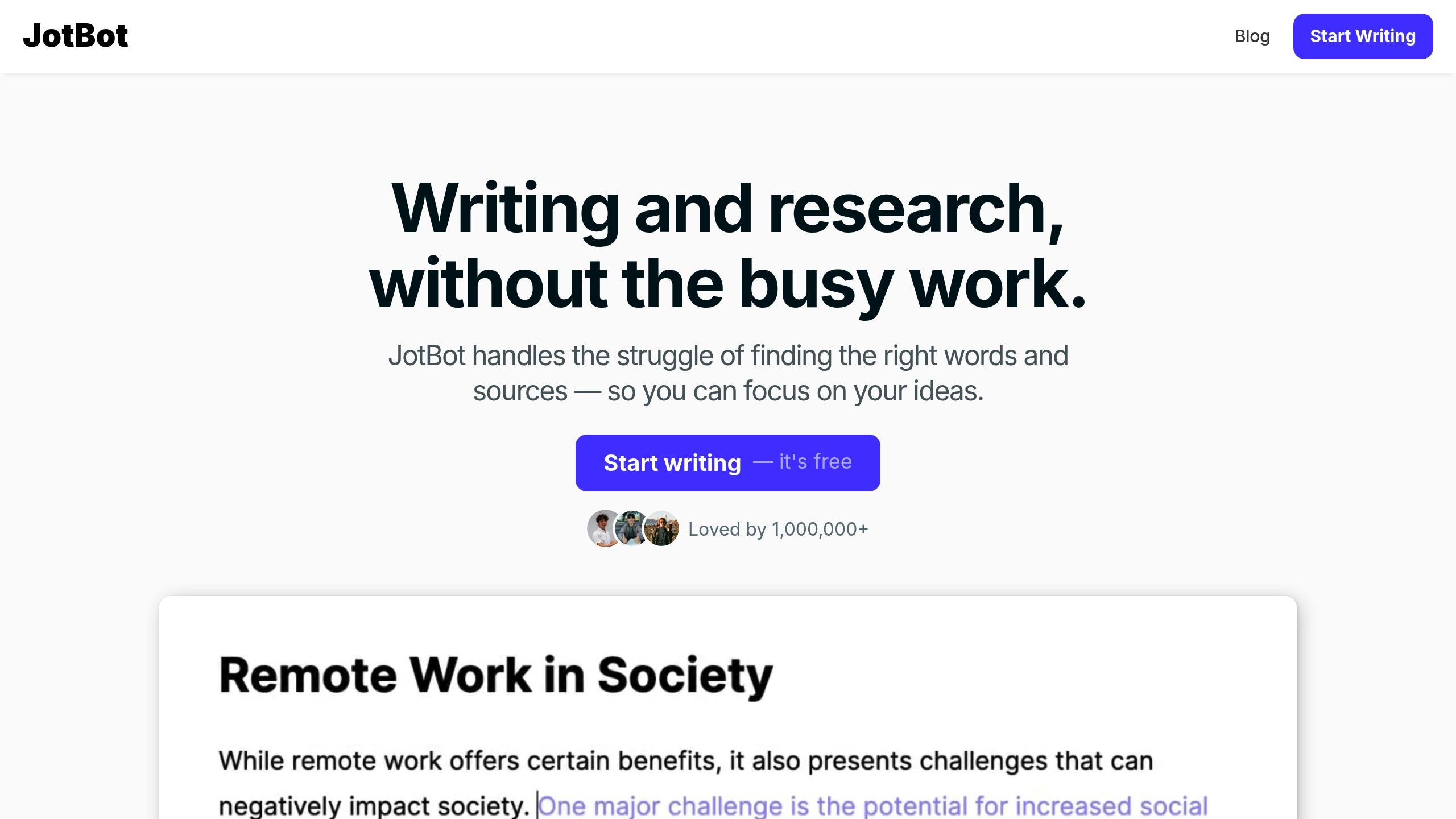
Literature Review AI
AI tools are transforming how researchers handle literature reviews by automating tasks like summarizing papers, managing citations, and organizing data. Here’s what you need to know:
- Simplify Summaries: Tools like Yomu AI and Elicit.org extract key points from dense academic papers, saving time during research.
- Citation Management: Tools such as HyperWrite's In-Cite AI Reference Generator ensure accurate and quick citation formatting.
- Data Organization: Platforms like Jotbot and Unriddle.AI help manage and categorize sources for easy access.
- Plagiarism Detection: AI ensures originality by comparing texts against large databases.
Quick Comparison:
| Tool | Key Features | Cost |
|---|---|---|
| Yomu AI | Summarization, citation generation, plagiarism detection | Paid |
| Elicit.org | Research question analysis, data synthesis | Free & Paid |
| Jotbot | Source discovery, AI note-taking, organization | Paid |
These tools save time, reduce errors, and let researchers focus on critical analysis. Choose the one that fits your workflow and budget best.
How to Use Elicit AI for Literature Reviews: Beginner Tutorial
Main AI Features for Literature Reviews
AI tools simplify literature review tasks like summarizing texts, managing citations, and checking for plagiarism.
Text Summarization Tools
AI-powered summarization tools help researchers quickly grasp key ideas from complex documents. For example, Yomu AI transforms detailed texts into concise summaries, keeping the main points intact. Similarly, Elicit condenses research material, making it easier to assess studies during the early stages.
| Feature | Purpose | Benefit |
|---|---|---|
| Key Point Extraction | Highlights main arguments | Speeds up paper evaluation |
| Theme Recognition | Groups similar concepts | Makes pattern identification easier |
| Abstract Generation | Provides brief overviews | Aids in quick screening |
These tools tackle the challenge of information overload, helping researchers focus on what matters most.
Automatic Citation Tools
AI also simplifies citation management. Tools like HyperWrite's In-Cite AI Reference Generator create accurate citations in various academic formats, ensuring consistency and saving time.
Plagiarism Check Systems
Maintaining research integrity is another area where AI excels. Advanced plagiarism detection tools compare texts against vast databases of academic papers and websites. This ensures proper credit is given to sources and helps maintain the quality of scholarly work.
Using AI for Research Tasks
AI simplifies research by automating tasks like finding papers, organizing data, and spotting patterns. These tools make it easier to handle the practical side of research.
Finding Research Papers
Platforms like Semantic Scholar go beyond basic keyword searches. They analyze citation patterns and peer-review status to highlight important studies. Their AI evaluates not just what papers say but also their context and influence, helping researchers focus on the most impactful work.
| Search Feature | Function | Impact |
|---|---|---|
| Citation Analysis | Tracks paper influence | Highlights key studies |
| Context Detection | Understands relationships | Finds related research |
| Smart Filtering | Sorts by relevance and date | Speeds up the process |
Managing Research Data
Tools like Jotbot and Unriddle.AI help manage research data efficiently. Jotbot transcribes and summarizes important points, while Unriddle.AI organizes materials and enables team annotations. These features allow teams to categorize information and create shareable summaries, making group work smoother.
Finding Research Patterns
AI doesn't stop at organizing data - it also identifies trends and gaps in research. For example, Elicit.org uses machine learning to analyze large datasets, helping researchers:
- Discover new research trends
- Pinpoint areas that need more study
- Connect insights from different studies
Iris AI takes it further by assisting in formulating research questions based on these patterns. This ensures that literature reviews not only summarize past work but also guide future investigations. Together, these tools make it easier to draw meaningful insights from the literature.
sbb-itb-1831901
Top AI Tools for Literature Reviews
Here are three AI platforms designed to simplify literature reviews. Let’s break down their key features.
Yomu AI Features

Yomu AI specializes in summarizing texts and generating citations in APA, MLA, and Chicago styles. It includes a plagiarism detection tool to help ensure originality when pulling information from multiple sources. Plus, it offers contextual writing suggestions to maintain clarity and an academic tone.
Elicit Features
Elicit is built to quickly extract insights from large collections of academic papers. Its automated review features include:
| Feature | Function | Benefit |
|---|---|---|
| Research Question Analysis | Processes queries to locate relevant studies | Cuts down on manual searching |
| Data Synthesis | Combines findings across studies | Provides thorough overviews |
| Customizable Templates | Formats reviews for various needs | Keeps reviews well-organized |
Elicit offers a free plan, with premium options starting at $12 per month.
Jotbot Features

Jotbot combines AI-powered note-taking with streamlined source management. Its standout tools include:
- Automatic source discovery and citation generation
- AI-assisted outlines tailored for literature reviews
- Smart note organization through tagging and categorization
The table below highlights how these tools compare:
| Feature | Yomu AI | Elicit | Jotbot |
|---|---|---|---|
| Text Summarization | ✓✓ | ✓ | ✓ |
| Citation Management | ✓✓ | ✓ | ✓✓ |
| Plagiarism Detection | ✓✓ | - | - |
| Research Organization | ✓ | ✓✓ | ✓✓ |
Each platform brings unique strengths to the table, addressing specific needs researchers face during literature reviews.
Summary and Next Steps
How AI Enhances Research
AI tools simplify the research process by automating tasks like summarizing articles, managing citations, and detecting plagiarism. They save time while helping maintain academic standards through built-in checks and organizational features.
| Feature | Benefit |
|---|---|
| Automated Summaries | Highlights key findings, reducing reading time |
| Reference Management | Keeps sources organized and accessible |
| Research Insights | Finds relevant studies and uncovers gaps |
| Plagiarism Checks | Ensures originality and academic integrity |
These tools make research more efficient, helping you focus on analysis and critical thinking.
Choosing the Right AI Tool
When selecting an AI tool, it's important to match it with your specific needs and workflow. Here are the top factors to consider:
- Workflow Integration: Does the tool fit into your current research process and work well with other software you use?
- Key Features: Identify the must-have capabilities, whether it's summarization, citation tools, or collaboration options.
- Cost: Compare free options like Elicit with paid plans starting at $12 per month to find the best fit for your budget.
The Future of AI in Research
AI research tools are evolving rapidly. Expect advancements in areas like:
- Data Analysis: More powerful algorithms for deeper insights.
- Team Collaboration: Improved tools for group research projects.
- Ethics in AI: A stronger focus on responsible and fair use of AI in academia.
- Database Integration: Better connections to research databases for seamless access.
These updates will make the research process even more precise and efficient, while continuing to uphold academic standards.
FAQs
How is AI used in literature review?
AI tools simplify literature reviews by handling tasks like screening articles, summarizing content, managing citations, and identifying patterns. This saves researchers time, especially during the initial stages of selecting papers.
| Task | AI Capability | Example Tool |
|---|---|---|
| Article Screening | Finds relevant studies | Semantic Scholar |
| Text Summarization | Highlights key findings | Unriddle.AI |
| Citation Management | Creates formatted references | In-Cite AI Reference Generator |
| Pattern Recognition | Links ideas across multiple papers | Elicit.org |
These tools streamline the process by ensuring thoroughness, accuracy, and automated analysis. For instance, Yomu AI can handle complex texts and even check for plagiarism, helping researchers maintain originality.
If you're just starting out with AI for literature reviews, Elicit's free plan is a great option. It offers basic features like identifying research gaps and summarizing findings, making it easy to explore AI's potential in academic research.
